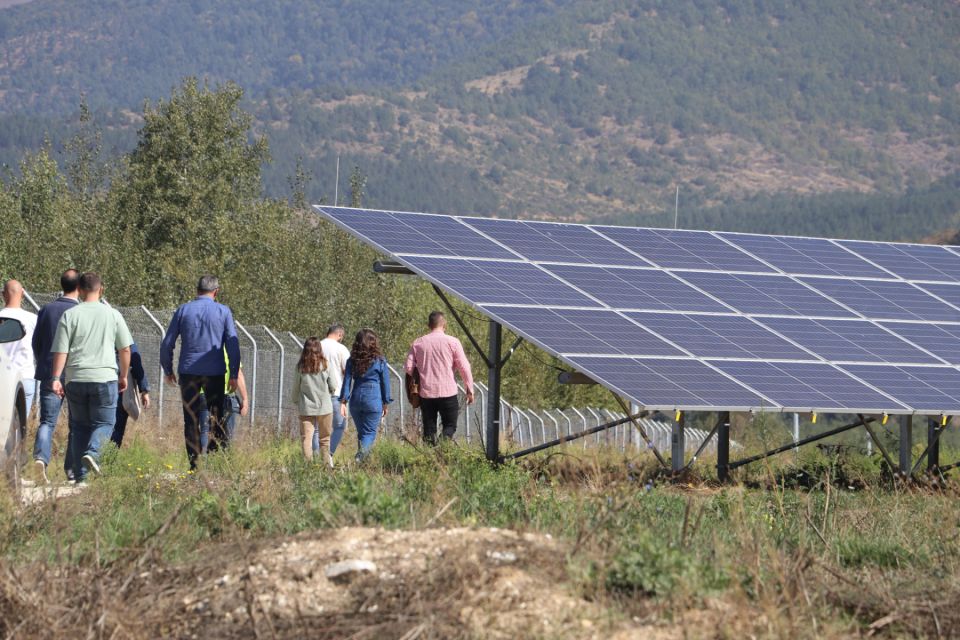A study trip to Northern Macedonia brings new ideas from civil society to politics
Germanwatch travelled to Northern Macedonia together with three partner organisations. On site, we learned that an open-cast lignite mine can become a solar park, how small businesses are revolutionising the electricity supply and why cross-border cooperation is particularly important for the energy transition in the Western Balkans. A travel report.
Oslomej is a very small village in the municipality of Kičevo in western North Macedonia. There used to be a big hole in the ground near the village - since the early 1980s, excavators have been pulling tons of lignite out of the ground here. However, the use of coal to generate electricity in North Macedonia should be a thing of the past by 2028, and today you can already see solar panels spread over 20 hectares of a still-active coal mine. The energy they produce can cover the electricity needs of 5,000 households. Oslomej has thus become a symbol of change in the Western Balkans. The region has begun to develop from a coal-mining location into a hotspot for renewable energies in Europe.
I have just returned from a study trip where we enthusisasts from around the region were presented with successful and promising model projects in Northern Macedonia - such as the one in Oslomej. In its cooperation with partner organisations in the Western Balkans, Germanwatch focuses primarily on the region's potential for a successful energy transition. Among other things, the focus is on what difference Germany can make together with the Western Balkan countries to raise this potential.
Good conditions for a successful energy transition
The mix of hydropower, wind and solar in the Balkan states is so ideal that North Macedonia has already announced the closure of its two coal-fired power plants for 2030. With this measure, the country also wants to meet the goal shared with the EU of achieving climate neutrality by 2050. Through its project activities, "German Watch", together with partner organizations from the region, participates in the processes that should ensure that North Macedonia, as well as the entire region, can comply with the announced scenarios of the gradual phase-out of coal and that their energy needs are successively covered from renewable energy sources. Along with our hosts on this study visit, the Eco-Svest organization from Skopje, we are collaborating on this project with the Balkan Green Foundation (BGF) from Pristina and the Belgrade Open School (BOŠ). Together, we strive to contribute to an environmentally and economically successful energy transition and improved cross-border cooperation in this area.
Northern Macedonia is a pioneer in the region in the expansion of renewable energies. This is shown not only by large-scale projects like the one in Oslomej. Smaller companies are also innovating. The company "Solar Macedonia", for example, offers complete solutions: Solar cells on the roof cover the energy needs of a household - and in combination with battery storage, they can even become energy self-sufficient. At the same time, the company thus brings the entire country closer to solving the problem of overloading the power grid by excessive feed-in during sunny days. Agriculture is also discovering the potential of renewable energies. Agricultural cooperatives are planning to supply their members with sustainable energy - they often have enough space for this, for example on the roofs of warehouses. For a holistic energy transition, cooperation partners of Germanwatch have, among other things, broken down which renewable energy source should best be used in which places in the country and made suggestions for wind farms, large-scale photovoltaic systems and household-based solutions.
Belica is a good example: a few years ago, the village was literally depopulated due to the emigration of young people to the West and characterised by a lack of prospects. In the meantime, the remaining inhabitants have turned the tide: With a lot of initiative and imagination, the village is bringing back young people; gentle tourism, sustainable agriculture and cheap energy are the recipes for success. The old school building will become the energy provider for the entire village, thanks to the planned solar panels.
Inspiration, exchange and peaceful cooperation
For the two delegations from Belgrade and Pristina that had travelled to the conference, there were some new ideas that they want to take back to their countries. Talking shop about technical details was as much a part of the study tour as the discussion about governments that need to be held accountable. Above all, the realisation that the energy transition in the region can only be achieved across borders and together prevailed. Thus, our project also has a peace-building component in a particularly conflict-ridden region. It was clear to all participants that mutual exchange should not remain an exception.
During those two days, a delegation made up of participants from Belgrade, Skopje, Pristina, but also Sarajevo and Germany visited North Macedonia in search of examples of good practice in the energy transition. Therefore, this project, in addition to contributing to the energy transition, also contributes to the establishment of regional cooperation in this topic.
Germany can contribute through climate partnership
For now, though, I am off to Albania, where the "Berlin Process" will take place this year. The German government launched this process in 2014 as an informal format for regional cooperation in the Western Balkans and to support EU rapprochement.
As part of this process, Germanwatch supports Germany's announced binding climate partnership with the entire region. Germany should support the partner countries in the Western Balkans with know-how and investments to advance the energy transition in a socially just and speedy manner. This is urgently needed: unfortunately, the latest "Comply or Close" report by Bankwatch once again reveals that all coal-fired power plants in the region exceed the set limits to which the Western Balkan states have agreed with the EU.
Furthermore, a more decentralised energy supply in the Balkans would solve two problems at once: Firstly, it would prevent the existing energy poverty, especially among vulnerable groups in the area, if they could choose local electricity providers with favourable prices. And secondly, such a bottom-up mechanism would democratise the energy market and empower consumers. Existing oligarchic systems in the fossil energy supply would be disempowered and the dependence on Russia or China in the energy sector could decrease. Germanwatch's current project therefore focuses on energy cooperatives and strengthens national civil society forums that, together with local partners, identify existing problems and put forward joint proposals to their national decision-makers. In doing so, we also rely on unusual partnerships - women's rights organisations work in the national forums, as do representatives from the business community. The energy transition is a topic which concerns us all and needs allies from all sectors.
I am curious to see what further progress Germanwatch can make together with its partner organisations. You are welcome to find out more about this path.
Verena Allert
Senior Advisor – Energy Transition Collaboration Western Balkans
You can see photos from the study trip here.
Author of photos: Belgrade Open School.

 381 60 30 65 800
381 60 30 65 800






